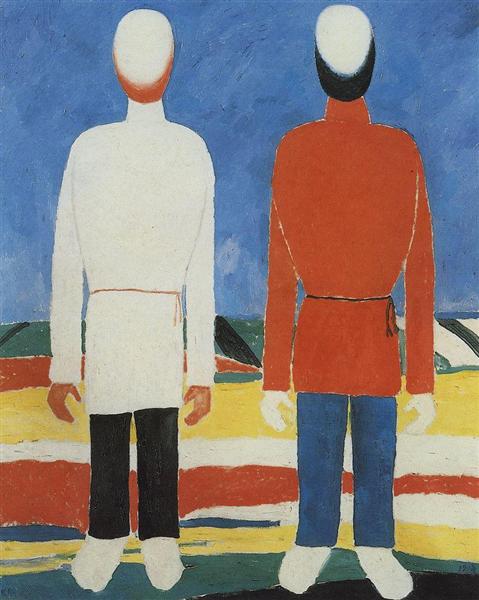Description
Kazimir Malevich, one of the seminal figures of abstract art and suprematism, offers us in his work "two male figures" (1930) a fascinating window towards the nuances of its artistic evolution. This painting, made in a transition period for Malevich, reflects a cautious return to more representative characters after its immersion in pure geometric abstraction.
In "two male figures," we observe a remarkable blur between figuration and abstraction. The work presents two vertical figures on a background divided into horizontal strips of intense colors: blue in the upper, red, black and green at the bottom. Human figures, simplified almost to their most basic forms, are distinguished by their rectangular torsos and oval heads. They lack anatomical or expressive details, reiterating Malevich's trend to reduce the figure to its most essential and geometric elements.
The figures, perhaps representing peasants or workers, are devoid of individual attributes, pointing out the universality of the human being within socialist ideology. This aspect of the work resonates with the socio -political situation of the Soviet Union of the time, where the individualities were subsumed under the mantle of the construction of the socialist state.
The use of color in this paint is particularly intriguing. Malevich, known for its chromatic approach, selects a vibrant contrast between the color stripes and the figures, mainly their white torsos that stand out strongly against the background. The choice of primary colors, complemented by black and white, can be read as a reference to its suprematist period, although in a much more figurative context.
Malevich had previously explored these forms and palettes in his masterpiece, "black square" (1915), and other suprematist compositions that sacrificed any figurative reference in pursuit of geometric and chromatic purity. However, in "two male figures," the artist seems to stretch that same supreme theory to cover recognizable figures, creating a bridge between the abstract and the figurative.
The position of the figures suggest stability and serenity that contrast with the dynamism of color funds, projecting a sensation of solidity and permanence. This quality is in dialogue with Malevich's intentions during his period after suprematism, when he was becoming more and more pressed by the new artistic guidelines of socialist realism in the USSR.
Even with these external pressures, Malevich does not abandon its commitment to reduction and abstraction, but integrates them with the new figurative demands. This synthesis is evident in "two male figures," where the human and geometric cohabit in common terrain.
In conclusion, "two male figures" is a testament to the mastery of Kazimir Malevich at the intersection of abstraction and figuration. The work, although apparently simple, is loaded with a richness of meanings and techniques that reflect both their personal and political changes in their time. The painting not only stands out for its beauty and formal balance, but also serves as a powerful historical and artistic document, encapsulating the tensions and resolutions of a world instead.
KUADROS ©, a famous paint on your wall.
Hand-made oil painting reproductions, with the quality of professional artists and the distinctive seal of KUADROS ©.
Art reproduction service with satisfaction guarantee. If you are not completely satisfied with the replica of your painting, we refund your money 100%.

